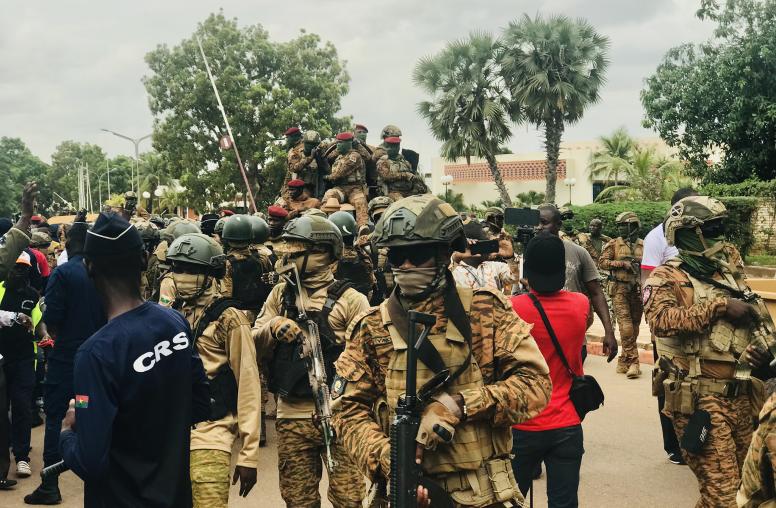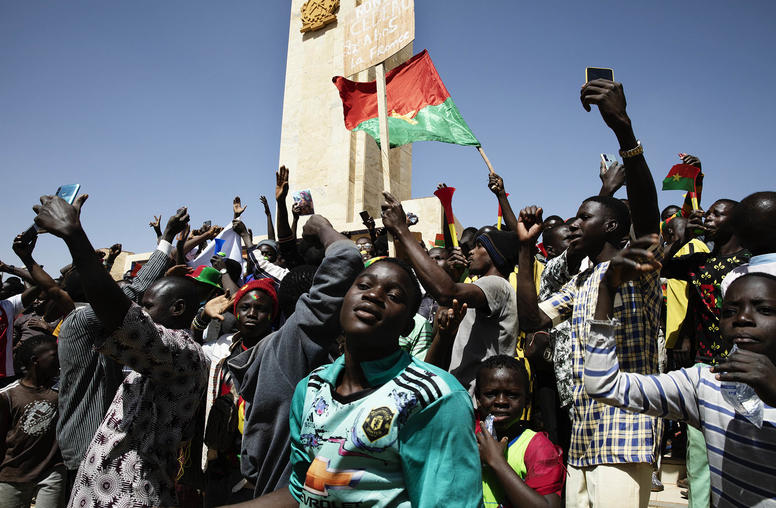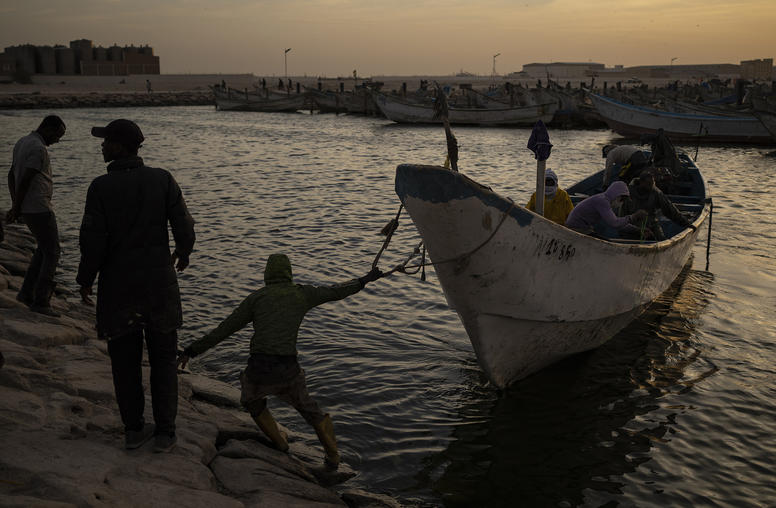After Two Coups, Mali Needs Regional Support to Bolster Democracy
Regional and international actors will need to prioritize locally devised and accepted solutions to tackle the roots causes of Mali’s troubles.
Editor’s Note: As the Biden administration convenes its Summit for Democracy, the U.S. Institute of Peace is convening a multi-part conversation about the shocking rise in military takeovers in 2021, featuring expert analysis on the dynamics driving coups in Sudan, Mali, Guinea and Myanmar and how regional institutions and global actors can help these countries get back on a democratic track.
Amid a 15-year global democratic recession, the Biden administration is convening over a hundred nations this week to revitalize democracy. This comes at a critical juncture, as democracy’s defenders are reeling from the growing challenges posed by authoritarian foes. The West African country of Mali puts these challenges in stark relief, after the country experienced two coups in a year. Underlying the crisis of coups in Mali is a deeper crisis of state legitimacy, which has been exacerbated by Western security assistance overly focused on short-term counterterrorism gains.
![Malian troops taking part in the Bastille Day 2013 military parade on the Champs-Élysées in Paris. Since August 2020, Mali’s military has overthrown two civilian-led governments. (Marie-Lan Nguyen/Wikimedia Commons/CC-BY 2.5]](/sites/default/files/styles/image_with_caption/public/2021-12/20211209_malian_troops_bastille_day_2013_paris_t091031-wikimedia-ac.jpg?itok=f0dviSM5)
What happened in Mali was part of a disturbing anti-democratic trend in 2021, identified by U.N. Secretary-General António Guterres as an “epidemic of coups.” The shocking rise in the number of coups and coup attempts in 2021 matches the highpoint for the 21st century.
To get Mali back on a democratic track, regional and international actors should engage with Malians to devise local solutions for tackling the root causes of the state’s legitimacy crisis, noted experts in an online forum at USIP. These recommendations are key for promoting democracy globally and inoculating the next country at risk of a military takeover.
A Crisis of State Legitimacy
Led by Colonel Assimi Goïta, Mali’s military seized power in an August 2020 coup amid nonviolent mass protests demanding the resignation of then President Ibrahim Boubacar Keita. For many Malians, Keita symbolized the government’s many failures, ranging from corruption to instability. Nine months after the August 2020 coup, Mali’s military arrested the interim civilian president and prime minister whose appointments the military had overseen — deemed by many as a “coup within a coup.” Goïta claimed that the cabinet formed by the civilian leaders violated the terms of Mali’s transition charter. Part of that charter also called for elections in February 2022 to fully restore civilian rule. The military government initially indicated it would stick to that timetable but has since demurred.
As former U.S. Special Envoy for the Sahel Region Peter Pham told a USIP audience, the deeply flawed March 2020 election — which saw a historically low voter turnout of 7.5 percent — was only the “proximate cause” of the August coup. “The crisis in the Sahel is not a crisis of violence, although violence is a manifestation of it. It's not an economic crisis, although the poor economy certainly exacerbates the situation. Ultimately, it’s a crisis of state legitimacy,” said Pham.
Mali’s manifold governance challenges have largely been overshadowed by its instability. The country sits in a volatile part of West Africa, known as the Sahel, where transnational terrorist groups like the Islamic State and al-Qaida operate. Domestically, Mali has long been wracked by intercommunal violence and attacks by Islamist groups. Mali’s security forces have met these challenges with heavy-handed responses: For example, Human Rights Watch found that security forces were implicated in over 250 unlawful killings of suspects and civilians between December 2019 and August 2020.
While both coups have been met with regional and international opprobrium, many Malians celebrated the August 2020 coup. According to women’s rights activist Miriam Diallo Drame, many saw the events of May 2021 as “people in power fighting among themselves,” she said. While Afrobarometer data finds that 75 percent of Malians prefer democracy, Drame said that Malians are so exhausted with instability and graft, they’re willing to give military leaders — thus far free of the taint of corruption — an opportunity to address the country’s longstanding challenges.
Ineffective Responses Before and After
Prior to the August 2020 coup, the international community’s engagement with Mali largely focused on counterterrorism. In recent years, the United States, France, the European Union and the United Nations have deployed thousands of military advisers to the region and invested hundreds of millions in counterterrorism efforts. But such a large investment comes with strings attached, meaning this assistance is aimed at addressing U.S. and French interests, namely defeating extremist groups. Of the $79 million in U.S. foreign development assistance Mali received in 2020, only 1 percent went to democracy, rights and governance.
These investments have changed the political landscape in Mali. The security crisis results in a lot of “resources being pumped to the military,” said Dr. Ibrahim Yahaya Ibrahim, an experienced Sahel analyst. Western investment has “shifted the balance between the political class and the military,” he said. Since 2012, Mali has more than doubled its military spending as a percentage of GDP. As the military grew in strength, parliamentary oversight remained weak and civil society lacked the access and expertise to serve as an effective watchdog.
While international security sector assistance helped contribute to the coup, the response of regional and international bodies has largely been ineffective and, in some cases, counterproductive. The August 2020 coup was met with a weak response from France, the United States, the African Union and the Economic Community of West African States (ECOWAS). ECOWAS’s more heavy-handed response to the second coup increased popular support for the junta, said Drame, as the sanctions it imposed hurt ordinary Malians the most.
The second coup resulted in more meaningful action from the international community. The United States withdrew its security assistance and France, Mali’s most important security partner, announced it would withhold aid. By July, however, Paris resumed military cooperation. All along, the European Union continued to work with Malian armed forces, ostensibly by making a convenient distinction between politics and military training. Mali’s military government looked to fill these gaps in military assistance by turning to the Wagner Group, a Kremlin-tied mercenary outfit.
Ultimately, responses to the coup have focused on reestablishing democratic governance but have paid insufficient attention to Mali’s underlying challenges and how international and regional involvement has negatively impacted the Malian government’s legitimacy.
Now What?
Since the coups, regional and international efforts to ensure a return to civilian rule have yielded little results, and in some cases fostered Malians’ sympathy for the military junta. Regional and International actors aiming to support a transition to stable democratic governance in Mali must course correct. Here’s how:
- Step up international engagement — but stop the lectures. U.S., French and regional efforts to pressure the military government to return the country to civilian governance have largely been counterproductive. Instead of telling Mali’s military leaders what they must do, engagement should focus on a dialogue that seeks to provide a better understanding of the needs, wishes and ideas of Malian partners, noted Pham. Lectures and threats play into longstanding grievances over France’s perceived paternalistic attitude, playing into the military government’s positioning of itself as a strong defender of Mali’s sovereignty.
- Rely on peer support. As noted, U.S. and other international efforts to pressure Mali’s military have yielded little results. An underrecognized and underutilized strategy is peer-to-peer diplomacy. One example of how this can work can be seen in the controversy over Mali’s negotiations with the Wagner Group to replace French troops. U.S. and French protestations about Wagner’s involvement have only fueled Mali’s grievances over the domineering role of Western powers. But many of Mali’s neighbors are nervous about Russia’s nefarious activities and malign influence. Mali’s neighbors should work with leaders in Bamako to jointly serve as a bulwark against foreign powers looking to advance their own interests above Africans’.
- Enhance U.S.-ECOWAS collaboration. The United States and its allies should work with ECOWAS by coupling sanctions with diplomatic and economic incentives for Mali’s government to restore constitutional order. The United State can also work with ECOWAS by strengthening its pro-democracy protocols, such as its recent effort to establish a regional standard limiting presidents to two elected terms in office.
- Cease the narrow focus on elections. Much of the international community’s focus has been on pushing for elections by February 2022. A narrow focus on conducting elections for their own sake is likely to backfire. At present, there are no viable political alternatives with the capacity to address the governance, economic and security issues that led to the 2020 coup, noted Ibrahim. Holding elections prematurely or as an end to themselves, without anchoring them within a negotiated and agreed roadmap toward democratic transition, will likely mean the cycle of coups will continue.
- Tackle the root causes of Mali’s state legitimacy crisis. The Malian government and international community’s myopic focus on security is at the core of the state’s legitimacy crisis, said Drame. Lack of services, corruption and continued instability have engendered deep disenchantment among Malians. Oversight institutions and civil society need to be empowered to hold the military and the government accountable for abuse and corruption. Western assistance should focus on aid and investment to sustain economic development and delivery of basic services, notably in the face of challenges to stability like COVID and climate change.
- Support locally driven solutions instead of imposing outside priorities. While Mali needs democratic governance that delivers for its citizens, it must also address its security crisis. Military solutions have not worked and many Malians believe that dialogue and negotiations with jihadist groups can help, noted Ibrahim. Malian authorities have proposed this contentious strategy, although they know it is a non-starter for many Western countries. The United States, France and regional leaders should instead support Mali’s government in negotiating with jihadist groups to find nonviolent solutions. Ultimately, democracy cannot flourish where instability reigns.



